Every puppy I have crate trained has loved their cosy den. They voluntarily go there to sleep, chew a toy or simply have a little respite from the rest of the bustling household. It provides your puppy a peaceful haven where he can’t be stepped on or poked, and gives your children a break from those needle sharp teeth. Crate training a puppy successfully involves building up very short periods of time in there, and coordinating those periods with times when they were likely to want a nap anyway. To begin with you’ll need to just open and shut the door momentarily, moving on to closing it for longer sessions and eventually leaving the room while they rest their furry heads. In this guide I’ll share my tried and tested step by step instructions for puppy crate training.
Contents
- How long does it take to crate train a puppy?
- Setting up your crate
- Step by step instructions
- Night vs day time crating
- What to do if the puppy cries in his crate
The main purposes of a crate are to help a puppy with learning to be clean in the home. And to provide a place of safety when he needs to rest or when you cannot supervise him. Although some people worry about crates being misused and causing distress, this little den really is just a tool that when used correctly will keep your puppy feeling secure, and your home safe from their tiny teeth and bathroom accidents during those early months together.
Using crates appropriately
A crate is of course simply a cage, and it really isn’t appropriate to keep a dog in a cage, and as dog guardians, I think we need to be aware of that. Like most training tools, and forms of restraint or confinement, there is scope for a puppy crate to be abuse.
You’ll need to be careful not to leave your puppy in there too long. Sometimes it can be difficult to know what is appropriate and what is not, so we talk about ‘how long is too long’ below.
How long will crate training take?
When they ask how long crate training will take, some puppy parents mean ‘when will their puppy stop crying’, others want to know when their puppies will be clean and dry in the house. These are obviously two very different issues.
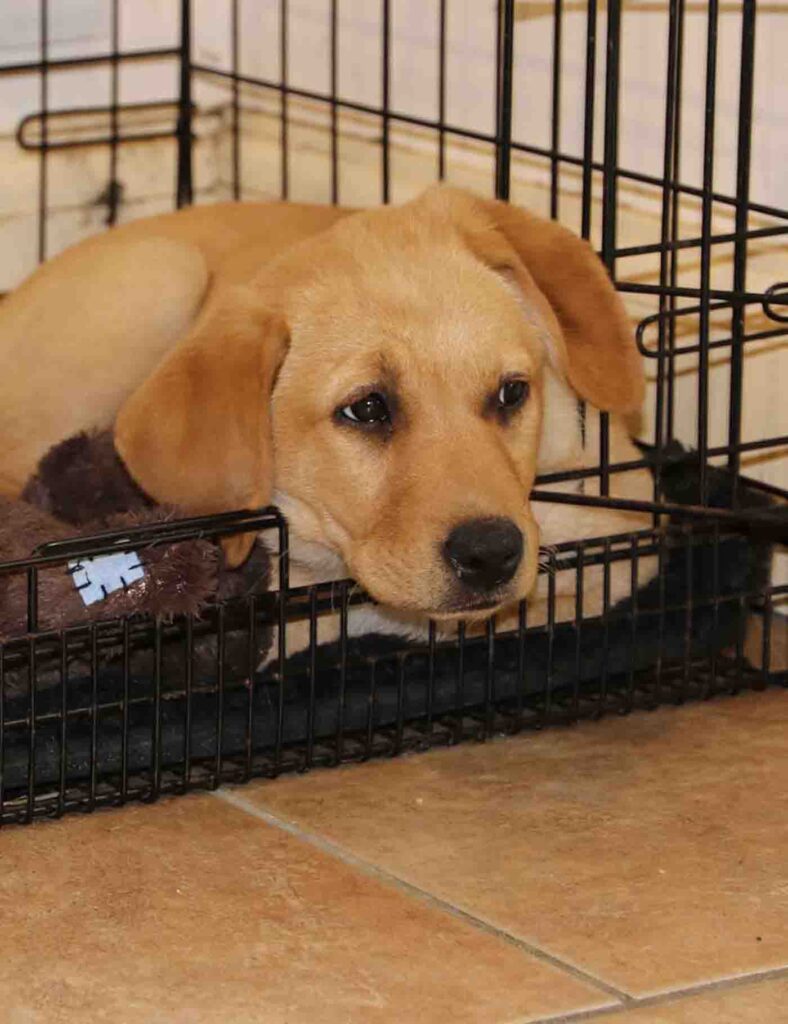
Getting used to the crate
Most puppies take a from a few days to a few weeks to settle into their crate happily without whining every time you leave the room if you shut the door. Some puppies make no fuss at all from day one, others will cry at night for the first week, and other will cry much more persistently but there is usually a reason for this.
We’ll look at coping with crying in more detail in a moment, but the key to success within a week or two is to keep crate times short and sweet. And to leave the puppy something nice in the crate to keep him occupied.
Potty training
Being able to take responsibility to get himself to his toilet area and to wait for a while if no-one is available to take him out is a process that takes a puppy several weeks. But, with careful management, and sensible use of a crate, many puppies will be effectively clean and dry quite quickly.
You should be seeing very few accidents by the end of week three after bringing your puppy home. And your puppy will probably manage seven hours a night by the time he is three months old. These are rough averages of course, don’t despair if your puppy is a little behind.
How to set up your crate
Crate training your Labrador puppy should not mean isolating him from the family. The crate should be placed in a room where people pass through or spend a lot of time.
Puppies need company and should not be banished to a back room or basement or isolated for long periods of time. The kitchen is ideal in most homes. But any busy family room will do. Place the crate away from draughts and direct heat – be careful to avoid places that are in direct sunlight at certain times of day.
Bedding for crates
It is tempting to shop for pretty padded beds to place in the crate, but stuffed beds are often ripped open by Labrador puppies so it’s a good idea to start with something that is a little more resistant to chewing.

It can be difficult with some Labrador puppies to find any bedding that they do not destroy.
Purpose made crate mats are a cosy and popular choice. These simple mats come in a great range of colours and sizes to fit most standards. Veterinary bedding is an ideal crate liner as it’s soft and washable and can be cut to size, but if your puppy chews it up and swallows bits of it, you may have to think again.
Water bottles for dog cages
It isn’t a good idea to leave a water bowl in a puppy crate. He’ll just play in it and spill it everywhere. He won’t need access to water in the crate to begin with because you will not be leaving him in there for longer than an hour or so, except at night.
An eight week old puppy will be fine without water during the night-time hours. You can buy water bottles to attach to dog crates and cages, but if you are leaving the dog so long that he needs water, he should probably be in a puppy pen, or kennel and run, not in a crate.
How to crate train a puppy
Here are my four stages to crate training. I call them
- 1 – Introduction
- 2 – Happy place
- 3 – Crate on command
- 4 – Growing up
You can find a summary of these in my crate training schedule chart below
#Stage 1 Introduction to crate training for puppies from 8 weeks old
This stage covers the first week that you bring your puppy home.
Your objective at stage 1 is simply to get the puppy used to being in and around the crate with the door open.
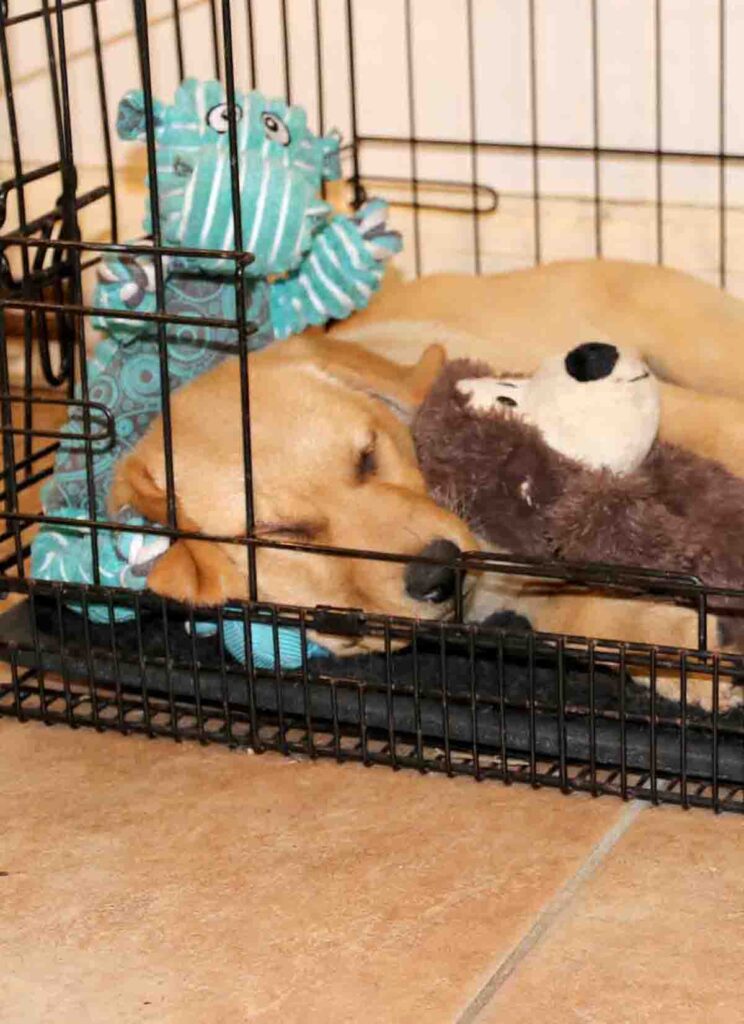
Leave the door open
Start by placing puppy in his crate frequently and each time you place him in there drop several little edible treats through the roof for him.
Don’t shut the door on him during the day to start with if you can avoid it. Just let him come straight out again when he has finished his treats.
This introduces the crate as a fun and enjoyable place to be.
Sometimes, drop treats in there when he isn’t looking, so he gets a nice surprise when he goes in there to explore.
Each time you pop the puppy into the crate say “in your crate” in a cheerful and upbeat way. He will soon come to associate this phrase with going into his crate for a treat
Closing the door briefly
The next step is to close the crate door momentarily and then open it again.
Leave it shut only long enough for the puppy to finish his treat and notice that the door is closed. Then let him out.
Do not wait until he gets upset or cries.
Repeat many, many times during the course of the next day or two.
Crate training at night
During the night, for the first two or three nights, it will be helpful if you can have the puppy sleep in a sturdy deep sided cardboard box or a portable carry crate*(paid link) by your bed.
If he is left alone at night whilst he is still homesick he is likely to howl, and howling in his new crate is not a habit we want to establish.
Tending to your puppy during the night
If the box is right up against the side of your bed, you can put your hand in and comfort him if he cries. You’ll also hear him becoming restless if he needs a wee.
If he doesn’t lie down again and go back to sleep when you put your hand in the box, he probably needs a trip to his outside toilet area.
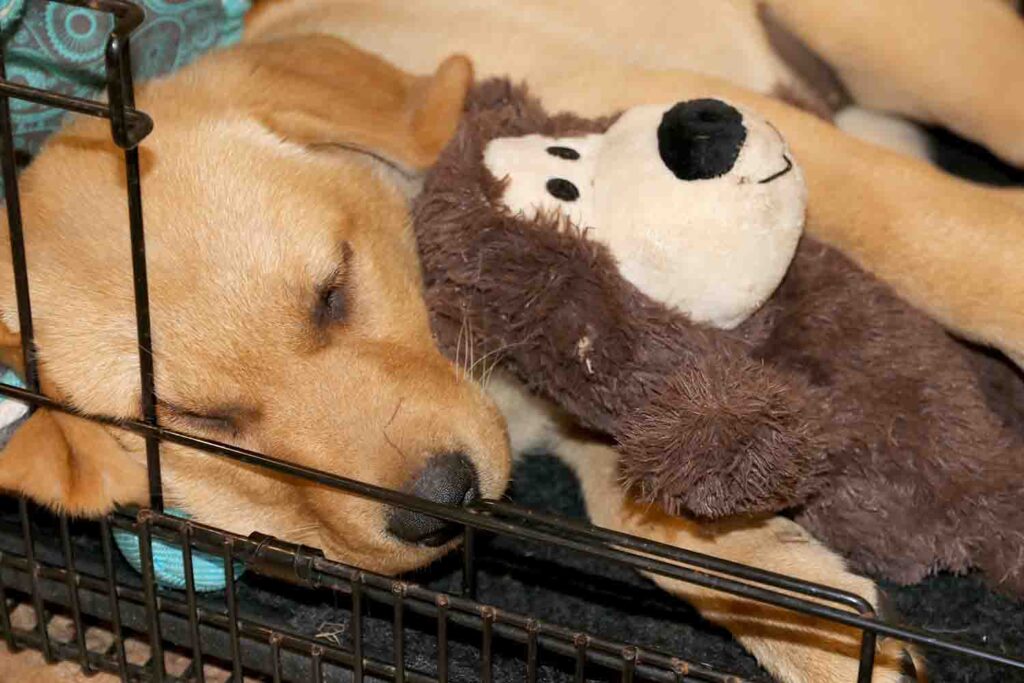
Moving your puppy downstairs at night
After the first three or four nights, or by the end of the first week, your puppy can be placed in his crate in the kitchen before you go up to bed at night.
He’ll probably cry for a little while, set your alarm for a little earlier than the time he has been waking for a wee and get him up and take him outside.
Don’t leave him more than five or six hours at night to start with.
So if you put him to bed at midnight, you will probably need to get up around 5am to let him out for a wee to begin with.
If a puppy has fallen asleep in his crate and slept for more than a couple of hours then you will need to let him out if he wakes up crying.
Getting more sleep!
If all goes well, you can stretch this five hours out by 15 minutes or so a night until you are getting seven hours sleep.
Feel your puppy’s bedding when you get him up in the morning. If he wets the bed you will need to get up earlier the next night.
I wouldn’t leave a puppy more than seven hours at night until he is around ten- twelve weeks old.
And some puppies will be 12 to 14 weeks before they can cope this long.
You can find lot more information on teaching your puppy to be clean and dry in our potty training sections.
Crate training during the day
There is no immediate need to crate your new puppy during the day for more than a few minutes at a time.
The main purpose of crating a puppy during the day is to
- Help the puppy learn to hold onto the contents of his bladder for a bit longer.
- To keep him safe when you are busy for short periods, or if you need to leave the house for a while.
- To give him chance to calm down or a break from small children.
However, you do need to get the puppy used to spending longer periods in the crate in preparation for being left alone from time to time when he is older.
So gradually, you will accustom the puppy to a few longer spells in his crate.
The reason some ‘training’ is involved is simply that the puppy need to learn to accept being in the crate without making a fuss.
And the next step in this process, or what I call ‘Stage 2’ in crate training, is making the crate his ‘happy place’
#Stage 2 Making the crate a happy place
For this stage, you are going to need at least three puppy Kongs*(paid link). These are tough hollow rubber toys that you fill with mushy food and freeze.
You can freeze several Kongs at once by standing them on a baking tray in the freezer.
Each time you put the puppy in his crate for more than a couple of minutes, you will leave a frozen food filled Kong in there to keep him company.
Puppies love these and will soon grow to associate the crate with the pleasure of the frozen Kong.
Here’s how you get the puppy used to being in the crate with the door shut.
How to get the puppy used to longer crate times
Once you have got to the end of the first week and the puppy has accepted the crate as a nice place to be, the next task is to get the puppy to accept the closed door for longer periods of time.

This may take a day or two.
Place him in the crate with his frozen kong and close the door for 30 seconds.
The idea is to leave the door closed for a few seconds longer each time you crate the puppy. But it is very important only to open the door when the puppy has been silent for several seconds.
What to do if the puppy cries in his crate
If the puppy starts to whimper or howl you will need to turn away from the crate and ignore him.
Busy yourself in the room but don’t look at him and don’t be tempted to open the door.
Wait for the silence as he stops crying and gets to work on his puppy kong.
Tell him what a good dog he is. Let him out immediately and go back to much briefer periods of closed door for a while.
Try ten seconds or five.
Build up again gradually, but do not be tempted to avoid crating him because it upsets him.
Once the puppy is happy in his crate, you can use it to help with his potty training.
Until then, make sure that you crate him for very short periods when you know his bladder is empty. Otherwise he will wet himself when he gets upset.
Puppies that cry need crating more often!
If your puppy whines in the crate, you need to crate him more often not less, and for shorter periods. Check out our in-depth article on coping with a crying puppy for more information
Just make sure that each time he is crated is very, very brief to begin with. That way he will learn that being crated is not a big deal
Warning: if you open the crate door whilst your puppy is howling, he will howl longer and harder next time!
Build up slowly to a minute, then two minutes, then three, five, seven, ten, fifteen minutes and so on.
How long can a puppy be left in a crate
People often ask how long a puppy can be left alone in his crate. If you ask ten experts this question you’ll get ten different answers, from “never leave a puppy in a crate” to “four hours or more”
My own personal rule is never to leave a dog over six months old in a crate for more than four hours at a stretch.
I personally wouldn’t do this on a regular daily basis either, though I know that many working puppy parents do.
For puppies three to six months old I think two hours is a maximum, and for puppies under three months, one hour.
If you need to leave your puppy for longer than this, then you need to consider a puppy proof room or pen where water and puppy pads are always available, or even a weatherproof outdoor kennel and run.
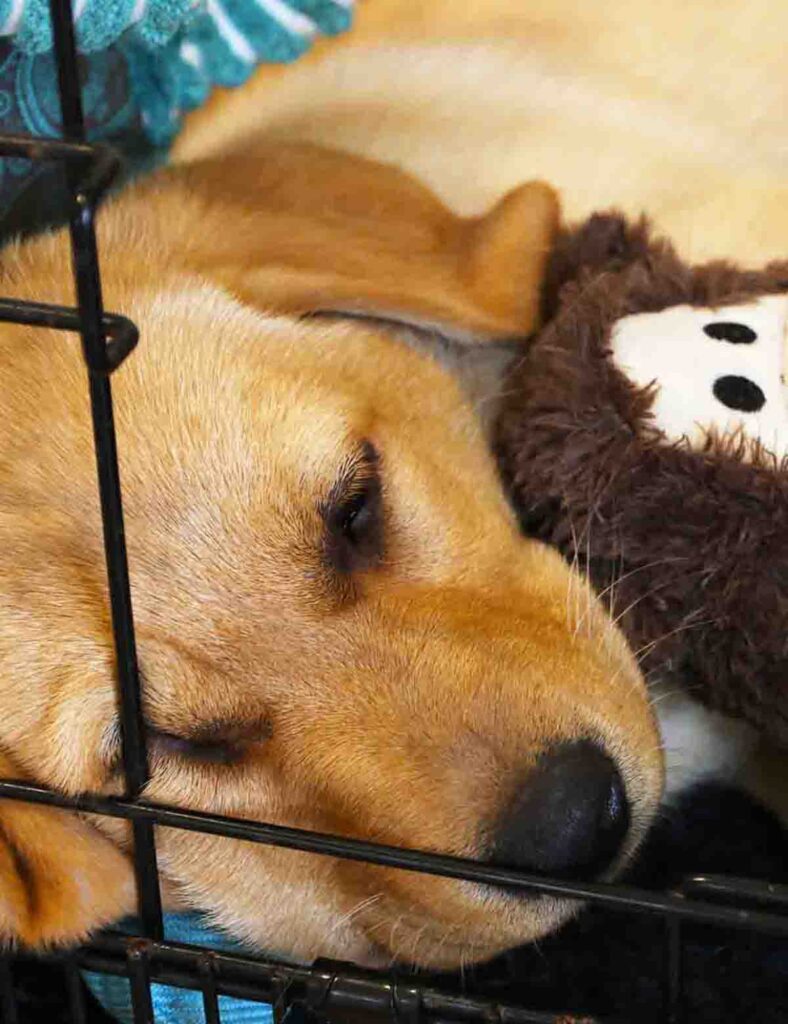
Crating your puppy while you work
It isn’t appropriate to leave puppies in crates for long periods of time, so if you are returning to work while your puppy is still small.
And don’t have anyone to help with his care, you’ll need to use a different system of potty training.
This involves putting puppy pads down in a large puppy pen or puppy proofed room so that your puppy always has access to a toilet area.
You can find out much more about overcoming the problems of being a working puppy parent in this article: combining a puppy with full time work.
#Stage 3 Training your puppy to go into his crate on command!
As your puppy grows bigger, picking him up and putting him in his crate becomes more of a physical event!
You don’t want to get into a situation where you have to chase your puppy around the kitchen and physically push him into his crate each time you go out.
So it’s a great idea to teach a puppy to go into his crate on your command or cue.
Provided you are not leaving your puppy alone for too long, he should be happy to go willingly into his crate.
This can be achieved through training.
Choosing a cue or command
It doesn’t matter what cue you choose. If you have been saying ‘into your crate’ each time you place the puppy in there, and he is happy to be there, then stick to that.
If you have got yourself into a situation where your puppy doesn’t want to go in his crate then choose a new cue, like ‘bed’ or ‘kennel’
It can be any word you like as long as it is not one he associates with anything unpleasant.
Advance crating
Until you finish the training, you’ll still need to physically put your puppy in his crate before you go out.
To avoid your puppy associating the crate with anything he doesn’t like (you leaving home for example), from now on and until you finish your training, crate the puppy at least ten minutes in advance of your departure, and don’t forget to make sure that there is always a nice kong full of frozen food waiting in there for him.
Training the ‘crate’ cue – or crate on command
You can now teach your puppy or older dog to go into the crate on command or cue.
This will probably take a couple of weeks. Maybe more if your puppy really does not like his crate at the moment.
Have several training sessions each day – at least three. And do 20 or 30 repetitions of the following exercise in each session.
This will take you about five minutes.
You will need a ‘clicker’ or other event marker.
If you are have never used one before, check out this article before you begin: Charging your clicker. You can use a word instead of a clicker, but you still need to ‘charge’ it
EXERCISE 1 approaching the crate
Have a pot of treats ready to hand on the table or in a treat bag attached to your waist.
Imagine a zone around the crate.
Visualise the boundaries of the ‘zone’. It should not be so small that the dog avoids it altogether. A couple of feet in each direction is fine.
The object is to get your puppy to choose to enter this zone.
- Have the dog in the room with you
- Make sure the crate door is wide open
- Click and treat (C&T) each time the dog enters the crate zone
- Immediately after your click, throw the treat outside the zone so that he has to re-enter to get the next reward.
- Repeat 20-30 times or for about five minutes
Note that this is different from ‘luring’ the puppy into the crate by putting treats inside it. You are teaching him to chose to approach the crate.
EXERCISE 2 entering the crate doorway
In this exercise, you are going to click and treat the dog for putting a nose, or a paw through the opening into a crate.
For some dogs this is too big a jump and you will need to work on a smaller crate zone first.
We are moving the goalposts and the dog will be surprised when you do not reward him for entering the zone.
He will quickly try something different.
To begin with we will do a few repetitions of the exercise he knows, just to get him ‘into the game’.
- Have the dog in the room with you
- Make sure the crate door is wide open
- Click and treat each time the dog enters the crate zone
- Repeat five times
- Throw the treat outside the zone so that he has to re-enter to get the next reward.
- The next time he enters the zone, wait for him to go closer to the crate and put his nose in the opening
What if he fails to do this?
If the dog wanders off without putting his nose into the crate entrance, start to C&T for entering the zone again.
Repeat from step 3 until the dog repeatedly puts his nose through the crate door.
Now you can stop rewarding him for simply entering the zone.
Intermediary steps for dogs that don’t want to go near the crate are rewarding him for
- Putting his nose within one foot of any part of the crate
- Placing his nose within two inches of the crate
- Putting his nose within two inches of the crate doorway
And so on.
You can’t fail at this. It just takes longer with some dogs than others. Use his entire food ration if necessary.
Don’t give in, he’ll do what you reward him for as soon as he is hungry.
Remember, if you have to go out, scoop him up without a word, and place him in there bodily.
Do not use the clicker or any other part of this process, or attempt to lure him in.
You going out is a punishment in his mind. Behavior that is punished will diminish.
EXERCISE 3 inside the crate
In this exercise the puppy walks right inside the crate. When you click, he will come dashing out again for his treat.
Again, we begin the exercise with something we know he can already do
- Have the dog in the room with you
- Make sure the crate door is wide open
- Click and treat each time the dog puts his nose through the crate doorway
- Repeat five times
- Throw each treat outside the zone so that he has to re-enter to get the next reward.
- The next time he puts his nose through the doorway, withold the click. Wait for him to go further in
- Repeat and gradually raise the criteria you are setting so that more and more of the dog must be through the doorway to get a reward.
The exercise is done when the dog repeatedly goes right inside his crate. With a dog that is not crate-shy, you can often work through these three Exercises in a day or two.
EXERCISE 4 spending time in the crate
- Have the dog in the room with you
- Make sure the crate door is wide open
- Click and treat each time the dog goes inside the crate
- Repeat five times
- The next time he enters the crate withold the click and treat for two seconds
- If he remains in the crate click and treat
- If he leaves the crate wait for him to re-enter
- Repeat from step five until he can wait 2 seconds in the crate and then increase to 3 seconds
- Work your way up to ten seconds
When the dog can cope with ten seconds waiting in the crate, you are ready to close the door. To begin with this will be momentary
EXERCISE 5 closing the door
- Have the dog in the room with you
- Make sure the crate door is wide open
- Click and treat after 10 seconds, each time the dog goes inside the crate
- Repeat five times
- The next time he enters the crate close the door and immediately open it again
- Wait a few seconds then
- If he remains in the crate click and treat
- If he leaves the crate wait for him to re-enter
Repeat from step five until he will go into the crate, watch you open and close the door, and remain in the crate for a few more seconds after you have opened the door.
We are nearly there!
EXERCISE 6 adding a cue
Now we are going to give this behavior a name. My crate command is ‘In Your Crate’. Use the cue you have chosen.
Make sure it isn’t too long a phrase and that it doesn’t sound too much like any of your other commands.
You know the procedure now. Here are the standards and criteria for exercise 6
- Click and treat the dog for entering the crate as in the previous exercise
- Don’t close the door every time
- Vary the number of seconds you expect him to wait in there for
- Start saying ‘in your crate’ quietly as he enters the crate
- To begin with he may start rushing out when he hears your voice and before he is properly in the crate
- He is just curious, be patient
- Click and treat without the cue a couple of times and then try again.
You are done with exercise 6 when you have done several sessions over more than one day, adding the ‘in your crate’ cue as the dog enters the crate.
We want him to have absorbed the association between this cue and the act of entering the crate. Now it is time to use the cue in advance of the behavior.
EXERCISE 7 responding to the cue
Have your treats to hand, but wait until the dog has lost interest, and decided you do not want to play the ‘crate game’
- Have the dog in the room with you
- Make sure the crate door is wide open
- Wait until the dog is away from the crate
- Give the cue ‘in your crate’ Do not repeat it
- If the dog goes into the crate click and treat
- If he doesn’t immediately go to the crate, walk towards the crate with him, and point to it
- Make encouraging noises and C&T immediately he pushes his nose through the door
- Then click and treat him a few times for entering the crate WITHOUT the cue
- Now do something else with the dog for a moment, stroke him, ask him to sit a few times, and then try again from step 4.
Once the dog is repeatedly racing into the crate on your cue, we need to make sure he can distinguish this command from other commands.
It is very common for a dog that has had intensive training like this to respond by ‘crating’ himself every time you get your treats out.
In this case the dog is not discriminating between different cues, but rather making assumptions about what game you are going to play.
So the next step in training is to mix in another cue.
The simplest is to alternate crating with ‘sit’.
EXERCISE 8 mixing cues
Using exactly the same principles as above, click and treat your dog several time for sitting to the command ‘SIT’.
Then use the cue ‘IN YOUR CRATE’ At this point many dogs will SIT.
If he is confused, and he may be, show him what you want, just like before. Follow this with several ‘In Your Crate’ cues and then mix in a few ‘SITs’ again.
Repeat until the dog can respond appropriately to either ‘In Your Crate’ or ‘Sit’ no matter what order they are given in, nor how many of each you ask for in turn.
You now have a dog that actually understands the meaning of In Your Crate and happily complies with your command.
It is time for him to adapt to being confined after being told to go in there.
Start slowly and build up
EXERCISE 9 adding duration
- Place a Kong with food in it, or some treats on a slow feed bowl into the crate without your dog spotting you
- Cue the dog into the crate (call him into the room first)
- Shut the door and leave it closed for one minute
- Open the door again and ignore the dog. It is up to him if he stays in the crate or comes out
- Repeat from step 1 gradually increasing the time you wait before opening the door
Vary the length of time you keep the door closed. Sometimes two minutes, sometimes as much as fifteen minutes. Keep repeating this exercise with lots of short crate times and the occasional longer one until you are occasionally leaving the dog in the closed crate for up to half an hour without any decrease in his enthusiasm for responding to the ‘crate’ command. Now you can begin to send the dog into his crate for longer periods, such as when you go out for an hour or so.
Maintenance tips
- Send the puppy into his crate often, not just when you need to.
- Make sure there is always a tasty treat or a Kong in there waiting for him
- Sometimes when you send him in, close the door
- If you know you are going to go out shut him in at least ten minutes before you start getting ready to leave
- If you know you are going to go out always leave him with a Kong full of frozen food
- When you are not going out, vary the times he is shut in from two to thirty minutes
- Send him in from time to time without closing the door
Provided your dog is not left overly long in a crate on a regular basis, this should overcome any shyness he has about going in there. Don’t forget that other than during the night, dogs should not be left in crates for long periods of time.
Dogs of any age can be trained to crate on cue using this system. For more information on using a clicker check out : Ten great reasons to start clicker training
#Stage 4 Growing up
By twelve weeks or three months old, many puppies will be sleeping 7 hours or more at night and going happily into their crates on cue, if they have been taught to do this. You probably won’t be able to have a ‘lie-in’ on a Sunday morning yet, but things should start to get easier for you.
One thing to watch out for at this point is a sudden increase in ‘accidents’. This tends to happen at the three or four month old mark as we ‘take our eye off the ball’ and stop supervising the puppy so much, or start leaving them in the crate a little too long.
When to let your puppy out of the crate at night
If all goes well, by about six months of age, your Labrador puppy should be clean and dry in the house, and sleeping soundly through the night in his crate. At this point, many puppy owners breath a big sigh of relief and start to look forward to the prospect of removing this massive and annoying crate from their kitchen for good.
Let’s face it, a cute dog basket with a nice cosy liner looks a lot more attractive in your home, than a great metal cage. So, at what age is it OK to start leaving a puppy loose in the kitchen overnight? And how do you get your dog used to a basket or dog bed, rather than sleeping in his crate?
Age related crate training schedules
Most people are reluctant to give out information on how long a puppy should be crated, or what to expect at different stages, because puppies are so different from one another.
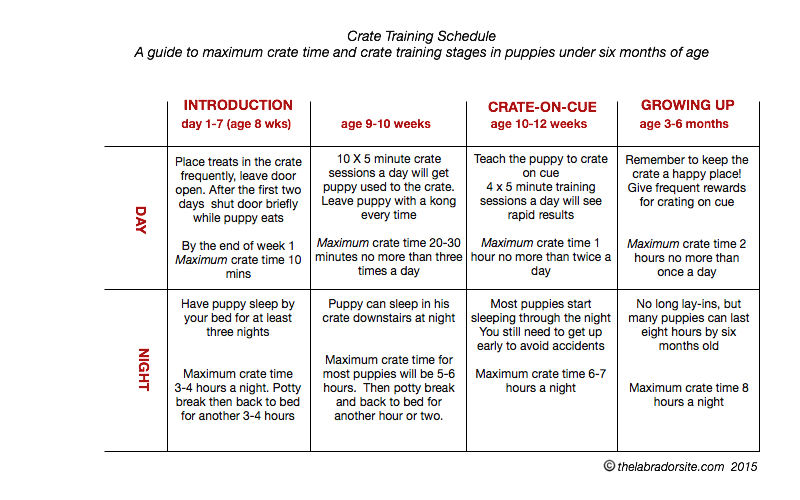
But I know how important it is for you to have some idea whether or not your puppy’s behavior and progress is normal. So, I have included a rough guide or puppy crate training chart above.
Please don’t feel your puppy must fit the profile for his age accurately. It really is just a rough guide.
Your best approach is to simply follow the four stages outlined above, from start to finish, and not worry too much about where your dog is at the moment.
In the meantime, if you are worried about your puppy’s progress with crate training or are having problems, do drop into our support forum and ask for help!
The Labrador Site Founder
Pippa Mattinson is the best selling author of The Happy Puppy Handbook, the Labrador Handbook, Choosing The Perfect Puppy, and Total Recall.
She is also the founder of the Gundog Trust and the Dogsnet Online Training Program
Pippa's online training courses were launched in 2019 and you can find the latest course dates on the Dogsnet website

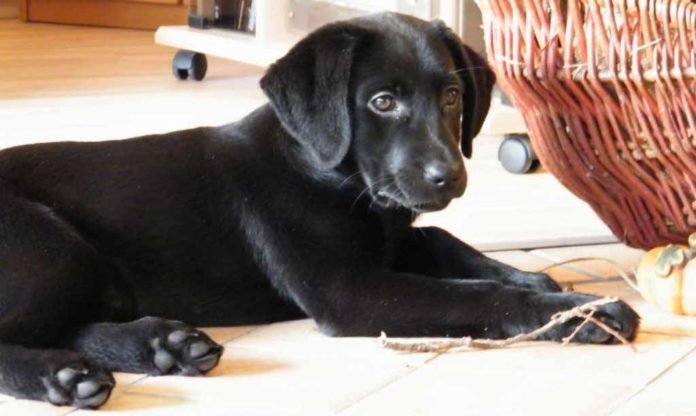











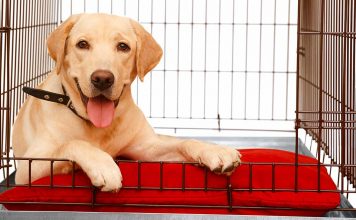

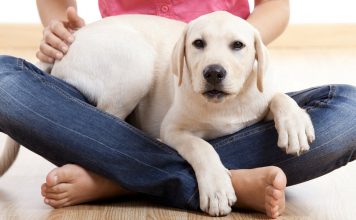







Hi Pippa,
We brought our lovely 8 week old chocolate labrador puppy home a few days ago. He is a really calm and content puppy and he seemed to fall in love with his crate straight away going in there freely. After all the things we had heard about crate training we thought we were very lucky indeed. The mainstays in his crate are his bedding, a fleece blanket wih his mothers scent as we wrapped it around her, and a couple of his favourite toys..He will quite happily go there when the doors are open and lay down and also be happy and sleep with the doors shut.
Night times however have been a different story – the first night he howled a lot and we had to get up every hour to take him for a wee, being careful only to enter when he was calm so as not to encourage howling. The second night was similar but he slept longer up to 1.5-2 hours at a time before howling and needing the toilet which included a poo accident on the kitchen floor. The third night we thought we would try ignoring the howling and barking for a longer period of time of three hours, but after 2.5 hours we were woken by awful howling and barking and unfortunately he did a couple of poos in his crate including on the fleece with his mums scent which now needs to be washed which night discomfort him further. He really is such a great puppy everyone says, but we’ve not quite cracked the nights yet. I see others who comment can get their puppy to sleep up to 5-6 hours at night without trouble. He is taken to the toilet several times a day and is on a kibble diet – same brand as breeder.. Are we doing anything wrong? Does he need more toilet trips during the daytime? Given the accident tonight in his crate we are now concerned about ignoring the howling and barking incase it happens again.
Look forward to your comments, thank you! Steve
Hey my names Jared and I recently (about a week ago) bought a lab puppy. He is only 9 weeks and i have tired putting him in a crate beside my bed but he cries/wines/barks for so long I tired putting a blanket over the crate which helped one night but then the past nights hes just slept with me and i plan on putting him outside when he gets older because of my mom but how can i train him for the crate or have i messed up with putting him in my bed? He does good by waking up and letting me know he needs to potty advice??
Hi Pippa.
We have had our 6 week old lab for 3 nights now. We have not used a crate, instead we have a bed which we have in our bedroom. The first night she whined frequently and she had a few accidents on the floor, which was expected. The second night, I woke up at 1, 3 and 5am to take her outside to go potty which she willingly did. She still whined a bit, but less than night #1. Last night, she seemed to sleep heavily, even snoring, but roamed around the room to different areas to sleep. She gave an insistent whine around 2am, so I woke up and before I could let her out, she pooped on the floor. However, I believe her whine indicated she needed to go potty.
It seems as though she prefers to pee and poop outside, as she has done so every time we take her out. If she continues to only whine when she needs to go in the middle of the night, would it be ok to not crate her and hope she can control her frequent potty trips as she gets older?
I should also mention that we do use a crate and he has never had an accident whilst crated. He even sleeps through the night (about 8 hours) without going so we know he is capable of holding it.
We have a one year old male lab who is still not 100% house trained. We take him out frequently (I mean frequently) and he does tell us when he needs to go but he can’t always hold it till he gets outside so he walks and pees inside till we get him out. Because of this behavior we’ve had him tested and he has had UTI’s…now every time he has an accident we’re taking in a pee sample. Last time there was no sign of a UTI, we even had his bladder xray’d and a culture done. There is no medical reason for him not holding his bladder. Is this common and will it get better?
I think I should also mention that Buddy was one from a litter of 9 and he spent most if not all of his time outside. He and his fellow pups slept on concrete outside with his mum before we picked him up. Buddy does not want to sleep on a towel or blanket on the tiles, just the tiles.
Hi Pippa,
My name is Alana and I’m writing to you from Sydney Australia. I wanted to start off by saying that your site is very helpful and I amazed and appreciative of the time you take to individually respond to most people. I hope you don’t mind if I ask a few questions of you, for your advice.
I have Buddy, an 8 week old Lab. We have had him for three days so far. He is doing generally well – going to the potty outside (only one accident) and the whining or missing home has certainly decreased over the last few days.
We had every intention of crate training him from the beginning but the crate didn’t arrive to us from the mail service until today (day 3) and so Buddy has spent the first two (dare I say crucial?) nights sleeping out of a crate on our tiled living room floor. He wakes every now and again to go to the toilet and mostly resettles well. But now we have the crate and I do want to promote it with him. We have put treats in and feed him in there; he goes in there to eat them, lots of praise, but he doesn’t spend any longer in there. Despite the crate having blankets and towels, toys and bedding, Buddy climbs back out when he wants to sleep. I was just wondering if you think he will eventually, with preserverence, willingly sleep in his crate? I have not yet closed the door on him but will begin trying that and using a clicker to mark silence if he cries. I think I’m looking for some encouragement because I mostly read how much labs love their crate/den and goes in there to sleep but my pup wants to sleep on my feet or just tiles. Thank you for your time. Hope to hear from you.
Alana
Hi Alana, and thank you for your kind comments. This article might help you https://www.thelabradorsite.com/training-your-labrador-puppy-to-crate-on-command/ Best, Pippa
Hi, me and my husband are supposed to be getting a new 8 week old lab puppy in a day or two, and I have a 16 month old baby. She loves animals, she usually just rubs and tries to hug them but I’ve never had a dog in the house while I’ve had her, ive read all of the puppy articles pretty much and I’m just wondering if it is smart to get a puppy, although I would love for them to grow up together. So confused! Please help!
Hi Shelbie, there are people that cope well with a toddler and a puppy, but in all honesty, it can be hard, even for an experienced dog owner. This article might help https://www.thelabradorsite.com/6-things-to-consider-before-buying-a-labrador/
Hey Pippa, I will be picking my black lab puppy up Dec 26, and I just wanted to know if letting him sleep in bed with me is an okay idea. I am so okay with him sleeping in my bed even once he is an adult, so it won’t be just a puppy thing. I appreciate your website so much!
hi pippa,
i am getting a lab puppy soon, he will be 8 weeks when i get him. i have two indoor cats ..any advice for the introductions?
thanks,
nicole
Hi
I have a black lab (currently 15 weeks) hes always gone in is cage ok and slept 8 hours thru night no mess. the most he has been left in the daytime is4.5 hours and is fine seems happy enough no mess. how old is it ok on odd days ( not every day) to leave him 8 hours ? i read on another sight 18 weeks plus is this correct ?
Hi Rachel, this is a contentious topic and one that there is no consensus on. I would not leave an adult dog alone without access to a toilet area, for 8 hours except in an emergency. I wouldn’t leave an older puppy (six months to a year) alone for more than four hours or so, and much younger puppies, much will depend on how long they can last without a wee. It really is a matter of opinion, but if you are crating a dog you need to consider that more than two hours is a very long time to be shut in a tiny space.
Hi
Myself and my partner are thinking about getting a black labrador puppy. We are both very keen but are worried about the fact that we both work full time and so after the initial settling in (I will be taking a few weeks holiday from work) it will be alone for the most part of the day.. We are a little worried about the puppy needing the toilet etc during this time, is it advisable/okay to leave a puppy/dog alone for such a long time during the day.
Thanks.
Hi Jodie, this is the article you need Should you get a labrador if you work full time
have a 10 week puppy that still howls 10 to 15 min and then every 2 to 3 hours. He hates being in hi s crate. I have done what you say and if we are in the room she is good. It is just at night.
Hello, really helpful article thank you! My question is with regards to what is the best thing to do with my puppy during the day? I have to leave him for a max of 1 1/2hrs 4 times this week whilst I go to work. He is crated at night, he cried for 1/2 an hour 1 st night, 15mins second night (we’ve only had him 2 days). I don’t want to put him off the crate by shutting him in there during the day while I am at work. Would a play pen be an idea? Any help would be very much appreciated.
Just to update, pup is now 12 weeks and quiet at night. We get up in the morning when he wakes up. However he still doesn’t like being crated during the day whether we are home or not. It seems to be the confinement he doesn’t like as opposed to the being alone which doesn’t bother him.
After reading all the problems people have had with their puppies this almost put me off getting mine! However, I am happy to report that it’s not all bad! I got Poppy, black lab 9 weeks old, a week ago tomorrow. I set up her crate toys etc inside her play pen and decided to use the clicker method of rewards. I threw a couple of treats inside her crate and she went inside no problem. 5 minutes later she lay down inside it and went to sleep. She loves her crate which is always open during the day. I started by leaving the pen open for her to come and go and then closing it for a minute then opening it again, gradually extending this throughout the day. She has picked up really quickly that when she goes outside that she has to do the toilet and looks to me for the click and a treat, although she still has little bladder control, accidents only happen when I don’t take her out often enough( thankfully just urination). She will get a play out in the kitchen diner for half an hour when she has just been to the toilet and when she voluntarily goes to her crate for a play with her toys or sleep, I close the play pen door. She wasn’t that keen on me leaving the room to do stuff around the house and howled and yelped for a bit before settling in her crate but I just I ignored her and never give her attention when she is crying for it. She howled and yelped for about 20 mins the first night and 5 the second night but I didn’t go down to her and she only needed out once at 5.30am. Since then she goes to bed at 11.30 and that is her until whatever time I get up at in the morning 8 or even 9. She is dry all night and doesn’t even cry to get out when she hears you upstairs. Not bad for a 9 week old! She sits on command and is learning the down command, clicker is a great help. All in all, she has done really well in her first week and I’m glad to say that you shouldn’t automatically think the worst case scenario! On and she is happy to lie in the footwell of the car sleeping whilst I’m driving on my own.
My family have just got our 1st black Labrador she is 9 weeks we are trying to crate train her,she goes in it in the day with abit of whining as im at work but she gets checked on every 2 hours as she goes out for the toilet and doesn’t do it in her bed but at night shes going to bed at 10.00 after being left out and doing her toilet but then crys for hours at night which we try and ignore but then she soils in her crate so im having to clean it up in middle of night,hee crate is in the lounge for now as its our busy room,am I doing it all right,many thanks
Hi, she probably soils her crate because she is getting upset. It sounds as though she spends a lot of time alone, she may settle more happily in some kind of day care. Night time crying tends to be over within a few days if you want to wait it out, or you could try putting her crate next to your bed at night, until she has got into a better sleeping routine. Check out the housetraining articles in the puppy care section and do consider joining the forum for support. Pippa
I have 2 six month old chocolate labs they are house trained and have their own crates at night time (in the same room) as advised by the vet, they are happy to go to bed in their crate but one of them wakes crying at 5 am sometimes earlier so I let them out to do their business and put them back to bed but he just sits there crying I don’t know what to do as I’ve tried ignoring it but it can last for hours his brother is not bothered and would probably sleep for longer if I didn’t get up to let them out.
When you get up to let him out, you reinforce the crying. If you feel he really needs to go out, then try and pre-empt him by letting him out early before he starts to cry, for a few days. You could also try putting a frozen kong in his crate when you put him back to bed. Check out this article for more info
Hi I have a 9 week old lab we have had him for 4 days now he’s coming out of his shell but becoming giddy and biting my 2 year old which leads to tears I don’t want to punish him because he is playing but he is leaving marks on my son what can I do ?
Here you are Amylouise Information on Biting
Hi Pippa
I have been reading all your articles and finding them very useful. My puppy is 11 weeks but we got it when he was 8 weeks old. The week following Xmas we had to leave him with a trainer because he was too young to travel with us. When we came back, we have been struggling in teaching him to relieve himself. The trainer told us that if he went outside the place we set for this in our apartment, while he can go out after his vaccination, we should hit the floor and put him in his crate for 45 mins and after we took him out, put him out there in the special place to go again, I read on your articles that since he is a puppy we should´t punish him, so I did not make a fuss about the accidents and just insisted on the next time for him to go in the place. I bought a tray with synthetic garden so that he could go there, because I also read you don´t recommend newspaper. He was doing fine, until now he likes to lie on the synthetic garden and bite at it and pull it instead of doing what he has to in it. He was doing great before that, he was a little excited and it looked like he wanted to rip it apart. I pulled him from it, and then he went and did his business on the floor kitchen instead. So I decided to put him in his crate for 45 min again. I don´t know if this is not the solution and that he is still a baby, but he was making a mess out of the tray.
I also read that at this time they usually sleep about 5 hours from the time you put him to sleep at night, but he will make noises and wake up every two hours, and when I tried stretching the time, he pooed inside the crate. Is it normal that he poos more than twice at night? Is it still an immature bladder? I am not getting any sleep at all at night, and I feel that the road that we advanced has gone back a few steps… is this normal, or what do you suggest?
Hi there, puppies will sometimes poo at night if they are anxious and get upset, but more usually, eliminating in the crate is a result of the crate being too big. Pippa
Hello,
I have a 3 month old black Lab and we have decided not to crate him. He is in the kitchen safe when we go out with his bed and toys and we do the same in the evening. So far we have had no problems at all, he loves his sleep, he goes to bed when we go to bed and wakes when we come down the stairs, he doesn’t bark or cry. I am now in 2 minds as every article I read says about how importing it is to crate puppies. My husband would rather we didn’t crate him, as he is going to be a big dog and I wouldn’t like to crate him when he is so big. Am I making a rod for my own back ? at the moment he stays on his own while we are at work (3 days a week) for about 5 hours but I do have people go round and check on him. Once he can go out (after his next vaccination) he will be taken out during the day too. He is a very happy dog and other than being quite hard to toilet train he is very good, I have tried the toilet training matts but he just runs off with them! I am sure once he can go out this will improve. Any advise greatly received! Thank you!
Hi Katie, if you and your puppy are happy with your present situation after a whole month, I see no point in messing with it. You may or may not find you have problems with chewing at some point, but some dogs are simply not a problem in this respect. Pippa
Hi, I have two 11 week old chocolate male labs. They are from the same litter and sleep in the same bed at night. They have started eating my kitchen at night time when they are left alone so we are looking into getting a cage for them. Can anybody advise which is better. Buy 2 small cages and separate them or buy 1 xl cage and put them in together till they get a bit older and hopefully stop being so destructive?
Thanks
My wife and I recently brought home our 7-week old lab puppy. Crate training has not gone very well so far. The first night we had him he slept for almost 6 hours in his crate before waking and starting to cry. Now he will not last 30 minutes. My wife works from home and she puts him in the crate for a small period during the day. He will cry for over an hour. Should the crying last this long? Do we need to keep him in for shorter periods of time instead and build back up?
Hi Nick, this is the article you need Pippa
Good early morning !
I have just brought a lab pup she has been with us for 3 days now so content in the day and I’m crate training her … I knew the first few nights would be tough but she howls and gets herself into such a tis she sicks up froth on her bed is this normal ? I leave her about 11 pm and get up at 5am with her inbetween those times she probably has 2 to 3 howling crying periods of around 10 to 15 minutes
Many thanks
Becky
Hi Pippa! I have an 8 week old pup, we’ve had him for 2 and a half days now, last night was his first night in the crate, and he howled, and howled, and barked, and barked. I know he can hold his pee for atleast 3 hours after relieving himself, so i set my alarm, and was up at 3, and then up at 6. I got a few hours of sleep, which means he must have been quiet for a little bit. Do I keep perserving, is this normal? I really want him to settle in his kennel. He gets fed 3 times a day right now, his last meal at 5, is it possible hes crying because hes hungry also?
what do you suggest?
Hi Samm
Have a look at these two articles: First days at home and How to cope with a crying puppy You might also find it helpful to join the forum and chat to other puppy owners 🙂 Pippa
Dear Pippa,
Thank you so much for the great articles; they are our main guide as we learn to live with a labrador puppy.
We brought Chicha home two days ago, at just over 8 weeks old, and so far she is proving to be a very mild-tempered little girl. She is showing almost no signs of separation anxiety and we want to do the “right things” to make sure she stays a happy, composed dog.
We live in an apartment and are committed to crate-training, and it’s lucky she seems to like her crate so far. She takes all her naps there during the day. She doesn’t seem to mind being crated at night either, but she seems to have a super immature bladder and needs to be let out almost every 1 1/2 to 2 hours to wee or do number two. After two draining nights (literally, my husband and I are like zombies and we have a toddler to take care of as well), we are wondering if we shouldn’t give those potty pads a try for a couple of weeks until her bladder control gets better, meaning letting her toilet inside during the night and making sure she doesn’t have any accidents during the day.
My question is: will it be more difficult to crate-train after she’s had free rein of the kitchen at night for so long?
Thank you so much!
Sylvia
Hi Sylvia, yes it will probably take a little longer to house train your puppy if you allow her to wee and poo indoors. But you need to do what you need to do in order to cope with your own family situation. 🙂 The first few nights can be hard, but this stage does not last for long. Best wishes Pippa
Dear Pippa,
Thank you for responding, and thank you again for all the advice. I decided to stick to the preemptive nighttime outings and it worked like a charm last night! I caught her awake but silent both times I went to take her out before morning. She did her business and settled right back to sleep, or was at least quiet. I am sleep-deprived but pretty elated. 😉
One more thing: since you are my authority on labrador training, which one of your books would you suggest I buy if I want to teach her good manners at home and out and about in the city?
Thank you again!
Sylvia
I forgot to say that I’d rather buy an e-book, as deliveries outside the UK (to Bulgaria) sometimes take a long time.
We have had our 6 month old chocolate lab for 3 weeks now and she has been really good in her crate of a night time sand occasionally through the day. The crate we are using has been divided so minimal space, I was wondering if we gave her the whole crate so a bit more room, would it be a step backwards? I don’t want her to foul in there but want to give her more space. Thanks
Hi,
I just adopted a 14 week old lab puppy named Lincoln and will be receiving him this Saturday. If it takes a few days to crate train, where should I put him to sleep the first few nights? I doubt a deep cardboard box would hold a 14 week old, would it? Should I just put his bed in my room and hope he sleeps in it, or should he sleep in my bed with me?
Thanks,
Megan
Hi Megan, click on the link to housetraining your puppy in the article above. You can also find this through the Puppies menu at the top of this page.
Pippa
Thank you Pippa. I read the article, but it still doesn’t answer my question as to where the puppy will sleep on the first night at my home. I can’t expect him to be comfortable in the crate the first day, can I? Won’t it take a few days until I can put him in it for that long? I’m also concerned because he is an older puppy and may not take to it as easily as an 8 week old, which seems to be the target age of most of the articles. I’m sure he’s ever even been in a crate, as he is a rescue dog and removed from a shelter at a young age and fostered with his litter mates. Thanks
Dear piper, i have a labrador puppy he is 18 weeks old this week,i started to take he to training classes but he was an embarrassment even the trainer couldn’t do anything with him we were trying to get him to lie down but he wouldn’t now i try this at home all the time but its as if doesn`t understand and if he does lie down he goes down side ways does this mean there is a problem with his back? he is very good at every thing else hope you can put my mind at rest , kind regards julie.
You need to continue working with him. He cannot be expected to learn things right away, the trainer should be able to continue working with you on this and let you know that he is a puppy and will require patience.
We have an 8 week old puppy who we brought home on Saturday. I think we have a truly blessed pup. She came home and we played and made a little fuss but put her into her crate for about half an hr to introduce it. She loved it :). That night she slept solid from 11-6. The next night again 🙂 I put her into the crate if I want to wash up or have a shower. She has a bed in there and a little water bowl of a night. She hasn’t wet or pooed in there and is into the habit of going outside.
We are very lucky I know but she has been in her crate for 3 hrs max so far and no mess 🙂
You are very lucky 🙂 and congratulations on your lovely new puppy. Pippa
Hi,
We brought home Charlie, our Black Lab, at 8 weeks. We already had a crate before bringing him home but with neither of us having had a pup before it would be an understatement to say we were novices! He cried as soon as the crate door was closed so we (stupidly) gave in and bought a pet pen, which is attached to his crate securely with cable ties (which he cannot access to chew). He has since slept in the pen and uses the crate to wee on a puppy pad through the night and in case he needs to while we are out for a couple of hours through the day. When we are home he always goes to the back door when he needs to go outside. He is now 16 weeks and still wees and often poos on his puppy pad through the night, despite us waking him to take him outside before we go to bed at about 11pm. He is normally asleep from around 8pm. The only problem we have is that he doesn’t make any noise to indicate he needs to go outside through the night, therefore we cannot take him to his spot in the garden. He generally sleeps until about 8am unless he hears somebody moving around upstairs first.
Also, when we leave him through the day (for up to 5 hours but not every day) he has access to his puppy pad, plenty of chew toys etc. He has started to destroy his puppy pad and we often come home to find it in many tiny pieces which need to be swept up, but also means that he has left nowhere appropriate to do his business if needed.
Any advice would be greatly appreciated!
Thanks,
Natalie
Hi Natalie, many puppies make no noise when they need to go out, I recommend you set an alarm for four hours after bed time. If the puppy is clean and dry then you can set the alarm a little later the next night. If he has messed, then set the alarm earlier the next night. As soon as you have found a time frame he can cope with, get rid of the puppy pads and block access to anywhere he has used as a toilet. Then it is just a question of stretching out the time he can last for which is partly a question of bladder maturity, and partly a question of building a new habit.
Good luck
Pippa
Thanks,
Charlie had his first dry night last night, it must be fate! Any suggestions about him destroying his pads through the day? He is alone from 8-12 and 13-16.30 in his pen.
Hey there,
we bought ben last thursday @ 8weeks old. I fully intend to crate him as
myself and girlfriend work. We where not prepared and hadnt bought
a crate so it has taken just under a week for the crate to arrive, ben
has been sleeping in a small dog bed given to me by my mother. I’m wondering if he will reject the crate for the small bed? i plan to throw the dog bed away or keep it locked in my shed, should i just persevere with crate introduction do you think there will be problems?
overall we feel lucky with ben as he hasnt howeled at night or cried really, only really made noise around 3 in the morning to let him out for a wee etc…just over 8 weeks he runs out to the back garden and does his business now. couple off acciedents in the house (living room rug) right enough but nothing major (touches wood) he can be a little too bitey and playful but we try to replace our clothes and things he shouldnt be biting with HIS toys..if we get bitten to hard i rattle a bottle filled with stones at him then ignore him for 5/10 mins…
Hi Pippa,
I have a 9 week old lab Milly! She is very lovely and typical. She has been with us for 6 days. We crated her during the night from the start and she has been great! She wakes at 5 am and everything has been fine until last night she cried and cried. As you can imagine after a half hour or so we began to think something was wrong or maybe she needed the toilet so my husband came down and took her down the garden. She just stood wagging her tail! Needless to say we had a very unsettled night and I finally got up and let her out at a very early 4:30 am. Why would this have happened all of a sudden after she was doing so well? Any advice or suggestions would be so appreciated.
Kindly,
Angie
Hi Angie, check out Night Waking. It is written with older puppies in mind, but might help. Also bear in mind that six days is not very long in the grand scheme of things 🙂 she is still very much a baby. If it happens again, try and pre-empt it by getting her up before she starts to cry, then gradually stretching the nights out again.
Pippa
And can u please tell me how i can training her ,she is very clever girl she just 8 weeks and she knows already command sit,and No. Just in 2 days she learn that . I can train her like basic comand like sit ,down but i dont know how to train her to walk on the lead and some like to not eat wall cos she doing this all the time
Hi Marija, the training information is here Pippa
Hello. I have black labrador 8 weeks old !!!
to many of people what i know saying black labrador its not original breed ,when im saying its black there a just loughing what i dont realy understand why!!!
Hi, I’m going to be looking after a 2 year old golden Labrador for a couple of weeks while his owner is on holiday. Last year he had to be in a crate as he chewed everything. He literally destroyed our garden and a lot of personal belongings. He is in a crate at his home but I’ve got reservations about putting an adult dog into a cage. He has calmed down but still chews. Can someone please advise me whether its normal to put a dog this age into a crate? He jumps up at people and I will basically have to walk him all day. I don’t have a dog myself and I never have. Any tips you could give me would be great. I’m on holiday at work so can be there all the time but don’t want to be spending the little time I have off being as stressed as I was last year 🙂
What a hero you are to give up your holiday to care for someone else’s dog! At 2 years old, this dog is probably only crated at night, and for short periods during the day if the owners go out without him. If this is what he is used to, then it shouldn’t worry him. Get the owners to give you a written list of his normal routine and try to stick to it. That way he will feel secure and is less likely to get upset if you leave him for a while.
There are articles on jumping up, chewing etc in the behaviour section, and you might find those helpful. If you take him for a walk at the beginning of the day, and early in the evening, he will hopefully relax for a few hours afterwards.
Some dogs do continue to chew up until around their second birthday, but I suspect you will find him a whole lot easier this time around.
Good luck!
Pippa
Hi Pippa, thanks for that. He’s a lovely dog. I’m sure we’ll have a great couple of weeks 🙂
Em
Hi, I have a 13 month old lab who is on his third (and finally forever) home with my family. He’s perfect in every way, except he falls to pieces when left home alone. He’s been with us 3 weeks now and has been left 3 times for very short amounts of time (the longest 40 minutes). He drew blood trying to get out of the cat flap and I worry that I’ll either end up with huge vets bills or a builders bill! So my question is, can I use the same methods to crate train him as I would a puppy? I need to overcome this for his own safety. Thanks in advance.
Hiya, I am about to have my first night with 8 week old Murphy and will hopefully be leaving him in his crate in the kitchen. I am intending on coming down in the night to let him out to the loo, but I was wondering whether to wake him up if I come down and he’s asleep or leave him?
Thanks in advance
Hi Frankie, wake the puppy the first night. If you don’t he’ll probably wake you anyway an hour or so later. Wake him a little later each night until he can last through the night. Pippa
Thanks Pippa, last night (night 3 of having him) I actually got the chance to wake him up rather than the other way around! But he has got into the habit of waking up almost exactly an hour after we’ve put him in his crate and settled him, and he cries and howls but when I let him out he doesn’t go to the loo. Should we just ignore him at this time and then go down an hour or so later (when he’s hopefully stopped crying) and wake him up to go to the loo? He’s quite a vocal puppy so I am trying so hard not to reinforce his noises!
Thanks
Hi, we just picked up Milo, an 8 week old chocolate lab. He is getting used to his crate but I’m a bit confused on one point.
I know we shouldn’t remove a whining puppy from the crate. But how do we know if the whining is just confinement (to be ignored until he’s quiet) or if he needs to relieve himself?
Thanks
Hi Kevin, you won’t know, which is why you should give him many opportunities to relieve himself during the day. If you think he may have a full bladder and you want to let him out, wait for a pause in the whining and mark the moment of silence with a clicker or a word that you use consistently for this purpose. Then let him out as his reward.
Pippa
Hi we have brought a 11 week old black lab we have had zack for a week and he is doing all his business outside. Zack sleeps in his cage on a night from 10.30pm till 6am no problems what so every we ,get up and let him out straight away .Zack does go in his cage during the day when we are at home he likes to sleep in there when wakes up we let him straight out and then he has a play then back to his cage for sleep again .Zack has just had his first injection and mircohip placed and been wormed and flead but when we leave him to go to work for 3hrs 30 mins first couple of times no accident in his cage but the last couple of days he has poo in his cage we let him out before we go and he does all his business I just don’t understand why he has done this any tips to help
Hi Lisa, could be a couple of reasons. It may be that the first couple of days when he was clean were a fluke, and that he is not yet sufficiently mature to control himself to this degree.
Or it could be that he is becoming distressed whilst you are out. Puppies will often evacuate their bowels when they are upset. This is involuntary, and not something they can control. Either way, it is a quite a long time to crate a small puppy during the day. You may need to get someone to come and let him out after an hour or two, or leave with someone else whilst you are at work, until he is more mature.
Pippa
Thank you very much for your help I will try that
Hi Pippa,
We are going to have our lab puppy in a few weeks time, and I would like to know if a 30″ dog cage would be big enough for an 8 weeks old puppy.
Congratulations on your site!
Skevi
There is a link and info on sizes in the article Skevi.
I have a 5 month old puppy who is fine in the crate, once I get him into it – thats the challenge. He doesn’t howl or cry or scratch.
Initially I put treats in there and some toys and he was excited went in and out and played in the crate. Lately whenever I get ready to leave, he runs away and thinks its a game. I have to physically pick him up and put him in the crate. I do give him a treat afterwards – i try to make it as positive as possible. (He’s in it for no more than 3 hours at any time)
Any suggestions on how to break this running away habit?
Hi Allison,
There is an article about this problem coming up on Sunday. I’ll post the link here when it is up
Pippa
perfect website
Hi, We just recently picked up our Chocolate Labrador puppy who is now 7 weeks and 4 days old. Tonight will be her 4th night and we have not had ANY success with crate training. No matter how much we get her accustomed to her crate with the door open, as soon as the door closes she starts whining/yelping and will not stop! My family and I all leave the house in the morning for work but we haven’t left her for longer than two hours during the day. At night, she doesn’t sleep for more than an hour at a time and when she’s not sleeping she’s yelping. Any suggestions?
Hi Alison,
Four days is a very short time and many puppies will not have settled in to their new homes at this point. Her crate is still not somewhere that she feels at home. You may find that she settles better at night by putting her crate in your bedroom for a few nights, this will give her chance to get used to the smells and sounds of her new home, and to feel safe when she is left alone.
I also recommend you join the forums for help and support from other Labrador owners.
Best wishes
Pippa
Hi
We are thinking if getting a lab puppy, a male. I am currently pregnant and am not sure this is a good idea, however I will have 10 weeks off with the pup before the baby is due, I have a toddler who us lively with Animals. I think it would be great to raise a baby and lab together. Do you have any advice. We have family near by and it’s mum is up the road so plenty if people to help out when I do go into labour? From Vicky
Hi Vicky, I think you will find people to support the arguments both for and against having a baby at the same time as a puppy.
This is a purely personal view. But I would say ‘don’t do it’. 🙂
Incidentally, I have raised four children on my own, and currently have four grandchildren under the age of five. Two are babies under three months old.
I think I can say with absolute certainty that my daughters are very happy that they don’t have a puppy to think about right now. It is kind of hard to remember just how tiring a small baby is, and how hard it is to focus on anything else once the baby arrives. Especially as you have a toddler too.
Perhaps your hardest challenge will be coping with a toddler and a puppy. A toddler cannot be left alone with a puppy at all, the constant supervision and/or separation will be wearing. And puppies are demanding little creatures, your puppy may not be fully house-trained before the baby arrives, and he will be needing a lot of training and attention at around the time your baby is due.
If you decide to go ahead, and you have not had a puppy before, do read everything you can lay your hands on so that you will be prepared.
And I wish you lots of luck
Pippa
We are collecting our chocolate lab next weekend. I am confused as to what size crate to get him. I think you are suggesting 36″ unless the lab is very large? We were advised by the breeder to get a 36″ but have got confused by other web sites suggesting 42″. Can you confirm which size would you go with? Many thanks
Hi Alan,
Some adult labs will need a larger crate, the breeder knows her own dogs and their likely final size, so I would go on her advice. You will a divider to begin with, or to borrow a puppy crate for the first few weeks, as the big one will be too large initially. I have amended the article to make this clearer.
Pippa
Day 3 of having our 8 week old lab ‘Nell’ and we tried to follow our vet’s guidance of getting her in the crate at night time as early as possible. So last night she went in well and settled for 2 hours, then howled and cried for 2 hours. We felt she was becoming distressed and went to her without fuss. A quick outside trip at 3am, then back in the crate but as soon as I left, the howling began again. I waited for a quiet few seconds and went back again without fuss. We both then slept in the lounge till 7am, and she didn’t yelp or move. What should we try tonight? Help!
Hi there,
Your puppy is crying for a couple of reasons.
1. He is crying because he is scared. He does not feel at home yet, his own home is far away. It will take a few days for him to accept your home as his own.
2. He is also crying because he is lonely, missing his brothers and sisters
The combination of these two factors is just too much for some puppies and they get very upset. There is also a risk that they will get into a habit of crying.
So, many people keep a crate by their bed for the first few nights until the puppy feels more at home. This takes up to a week. You can then move his crate downstairs into the kitchen, where he may still cry a bit, because he will be lonely. But he will get over it more quickly because he feels ‘at home’.
The alternative is to leave the puppy alone and just let him cry it out. Some puppies are soothed by a radio or a ticking clock, and/or a stone hot water bottle. But for many puppies, some degree of crying is inevitable I’m afraid. If you reward the crying with attention, he is likely to keep it up so you need to decide your strategy and stick to it.
Pippa
We will be collecting our lab puppy in six weeks when he is eight weeks old.
Whar size crate would you suggest to start with?
John
Hi,
I have a 13 weeek puppy and he has never (yet) weed or soiled in his crate over night. A few days ago we decided to take his crate away and leave him in a bed over night, rather than his crate. However now when we come down in the morning there is wee and poo everywhere! I don’t understand why this has happened? Is this usual if and when you take a dogs crate away? Have we taken the crate away too early? When do you think it is acceptable to take your puppy/dog out of his crate over night?
Jesse
Hi Jesse, your puppy is far too young to be de-crated. Keep him in a crate at night until he has been clean and dry in the house for at least three months during the day, and until he has stopped chewing the furniture. Many Labradors can be de-crated at around a year old. Some keen chewers need to be crated for a few months longer. Pippa
Hi this may sound silly but I’m getting a puppy (hasn’t been born yet)and I already have 2 cats so therefore a litter tray that the cats don’t use any-more; could I train pup to use this to start with?
Hi Roze, you could train your puppy to use a litter tray but then you would have to train him all over again to go outside so I wouldn’t recommend it. It is quicker and easier in the long run to teach the puppy to toilet outside from the very beginning. Good luck with your puppy. 🙂 Pippa
Does the process change as they get older, we got our pup at 12 weeks and the last few nights have lead us to give this a try.
Hi Danielle, at twelve weeks your puppy may be able to last a bit longer at night than a new puppy, but it is best to err on the side of caution and not leave him too long to begin with. Pippa
How does this crate training work with dog which will go outside in a kennel during the day. My last lab was a surprise present from my then boyfriend (now husband) and I was working full time so he practically went it his kennel from the start as crates were unheard of then. We are hoping to get a new puppy soon(nelson the surprise died recently aged 13) and should I bother with crate training or concentrate on getting it used to its kennel.